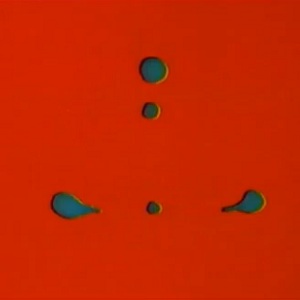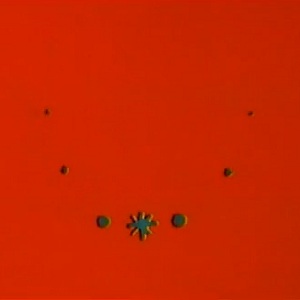Subversive Saturday: Dots (1940)
Director: Norman McLaren
Country: USA
Genre: Short | Animation
Watch it: Here
Editor’s note: The following review is a continuation of Matthew Blevins’ Subversive Saturdays series.
Language is one of those necessary evils that results from a need to communicate objectively in a world of strict rationalism. Its syntax and structure invade our thoughts and dreams and our inner stream of consciousness is often reduced to its clumsily confining borders. Some find themselves alienated when art tries to communicate abstract truths that cannot be encapsulated in its inadequate borders. If language was the most important element in communicating an idea, then literature would be the only necessary art for capturing the human experience. Mainstream film is shackled to language as any other forms of expression will often alienate an audience that has spent a lifetime believing in the absolute totality in language’s ability to express ideas. Artists in the avant garde understand language’s limited capacity and choose more abstract methods for the conveyance of ideas. This is not to suggest that language does not serve a critical role in interpersonal communication and in the conveyance of both objective and abstract ideas, but we live in a culture that values language as the de facto standard for achieving this communication, even if more abstract forms of expression are capable of representing the idea more succinctly and completely.
Mainstream film is shackled to language as any other forms of expression will often alienate an audience that has spent a lifetime believing in the absolute totality in language’s ability to express ideas.
 One of the pioneers in avant garde film that valued poetry over pedantry was Norman McLaren. His experimental films were wildly diverse in both content and form, but one film that was particularly effective at expressing the concept of devalued language was his 1940 animated film Dots. What seems like a simple exercise in animation and synthesized sounds takes on new dimensions when you learn the way in which the work was created. McLaren created animations in which not only the images were hand painted directly on the frame, but the very soundtrack was drawn directly on to the edges of the frame and processed by an audio interpretation machine that could take those meticulous shapes of varying widths and intensity and translate them in to audible sounds. What he achieved was a new abstract language devoid of the clumsy syntax and form of conventional language, and its auditory “language” was just as alien to the natural world as the film’s abstract visual forms.
One of the pioneers in avant garde film that valued poetry over pedantry was Norman McLaren. His experimental films were wildly diverse in both content and form, but one film that was particularly effective at expressing the concept of devalued language was his 1940 animated film Dots. What seems like a simple exercise in animation and synthesized sounds takes on new dimensions when you learn the way in which the work was created. McLaren created animations in which not only the images were hand painted directly on the frame, but the very soundtrack was drawn directly on to the edges of the frame and processed by an audio interpretation machine that could take those meticulous shapes of varying widths and intensity and translate them in to audible sounds. What he achieved was a new abstract language devoid of the clumsy syntax and form of conventional language, and its auditory “language” was just as alien to the natural world as the film’s abstract visual forms.
This experimental technique takes the theory of auteur filmmaking to its limits. Not only is McLaren dictating the visual reality in which the film exists, but he is also creating a new form of language that is devoid of conventional syntax and grammar. The entire universe of the film was brought to fruition by McLaren’s steady hand, and no element in the film would exist without his direct influence. When you are watching Dots, you are experiencing a world that only exists in the thoughts and emotions of another person. There are no frames of reference to cling to when experiencing a film like this, and so you are forced to relinquish your ego to temporarily replace it with that of the artist. Its effects are alienating to the uninitiated, but such alienation is bound to occur when an artist tries to express something that doesn’t fit cleanly into the confines of cold rationalization.
Not only is McLaren dictating the visual reality in which the film exists, but he is also creating a new form of language that is devoid of conventional syntax and grammar. The entire universe of the film was brought to fruition by McLaren’s steady hand, and no element in the film would exist without his direct influence.
 It is hard for the poetic thinker to understand why such alienation takes place when rationalists are confronted with unfamiliar sensory information. Strict rationalism is limiting, and if an idea or emotion doesn’t at least partially fit into a previously known context the rationalist will immediately jettison the new information as unimportant and unintelligible garbage. Just because an idea can’t be quantified, categorized, identified, or otherwise easily expressed in the limited syntax and grammar of language does not mean that the idea is not very real and a necessary component in capturing the nature of existence. I could never completely relate the feeling of witnessing the birth of a child in mere words, nor could I ever completely encapsulate what it is to fully engage with a Tarkovsky film, even if I had an infinite number of words to do so. I can tell you that Norman McLaren’s Dots is both playful and masterful in its exercises in spatiality. I can describe how the titular dots dance around the frame, exploding, contracting, combining, and existing as abstract ideas that once occupied an artist’s mind until he figured out a means of conveying these ideas and retaining them for posterity. I can describe the alien nature of the synthesized sounds as the dots engaged in their playful cosmic dance. I could hire the world’s greatest writers to write volumes on a single one minute and thirty-nine second animated film, but until you witness it, engage with its content and form, and formulate your own opinions on any meaning or lack thereof, you simply have not experienced it completely.
It is hard for the poetic thinker to understand why such alienation takes place when rationalists are confronted with unfamiliar sensory information. Strict rationalism is limiting, and if an idea or emotion doesn’t at least partially fit into a previously known context the rationalist will immediately jettison the new information as unimportant and unintelligible garbage. Just because an idea can’t be quantified, categorized, identified, or otherwise easily expressed in the limited syntax and grammar of language does not mean that the idea is not very real and a necessary component in capturing the nature of existence. I could never completely relate the feeling of witnessing the birth of a child in mere words, nor could I ever completely encapsulate what it is to fully engage with a Tarkovsky film, even if I had an infinite number of words to do so. I can tell you that Norman McLaren’s Dots is both playful and masterful in its exercises in spatiality. I can describe how the titular dots dance around the frame, exploding, contracting, combining, and existing as abstract ideas that once occupied an artist’s mind until he figured out a means of conveying these ideas and retaining them for posterity. I can describe the alien nature of the synthesized sounds as the dots engaged in their playful cosmic dance. I could hire the world’s greatest writers to write volumes on a single one minute and thirty-nine second animated film, but until you witness it, engage with its content and form, and formulate your own opinions on any meaning or lack thereof, you simply have not experienced it completely.













 Review: Seeking a Friend for the End of the World (2012)
Review: Seeking a Friend for the End of the World (2012) Review: Edge (2010)
Review: Edge (2010) Review: Extraterrestrial (2011)
Review: Extraterrestrial (2011) Review: To Rome With Love (2012)
Review: To Rome With Love (2012) Review: 2 Days in New York (2012)
Review: 2 Days in New York (2012)



